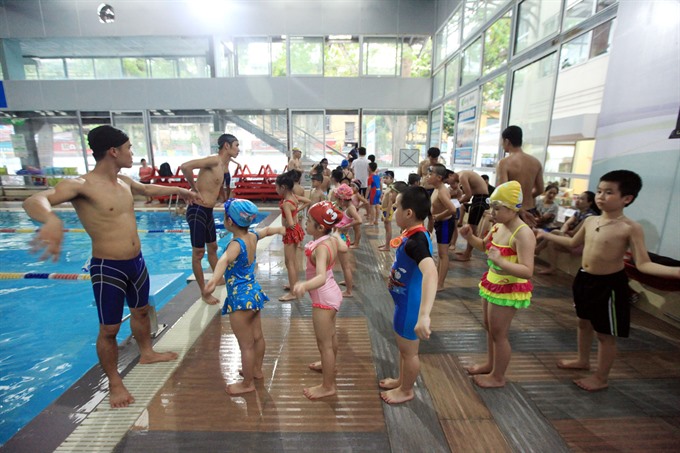 Society
Society

As people rush to swimming pools to escape summer heat, experts and officials are worried that the poor quality of water at the pools could cause and spread infectious diseases.
 |
| Primary students at their swimming class at a pool in Hà Nội.Inspections of swimming pools focus more on safety, rescue plans and healthcare.— VNA/VNS Photo Anh Tuấn |
HÀ NỘI — As people rush to swimming pools to escape summer heat, experts and officials are worried that the poor quality of water at the pools could cause and spread infectious diseases.
According to a circular issued by the Ministry of Culture, Sports and Tourism in 2011, its branches in cities and provinces are responsible for the operation of swimming pools in the localities. This means that Culture, Sports and Tourism Departments must inspect and punish swimming pools’ owners if the swimming pools fail to meet specific requirements such as water quality.
The swimming pool operators can have their water samples tested at any qualified health centres.
However, Hải quan (Customs) newspaper has reported that few swimming pool operators strictly follow water quality regulations, at least in sending water samples for testing.
Inspections of swimming pools focus more on safety, rescue plans and healthcare.
Preventive medicine centres are assigned to inspect and control the quality of swimming pools but an official from the Hà Nội Preventive Medicine Centre said that water at swimming pools was tested just once a year because of modest funding for the tests.
The centre was able to test some of the swimming pools in the city. Other swimming pools will be examined by districts’ preventive medicine centres.
“Most of the swimming pool operators submitted water samples for testing at healthcare units by themselves, then they would announce the testing results and take responsibility for the announcement,” the official said.
“There are cases when swimming pool operators ignore quality requirements and just care about profits,” he said.
On average, in every district in Hà Nội, there are about ten swimming pools which usually become overcrowded during summer. Swimming fares range from VNĐ40,000-50,000 for adult, VNĐ30,000 -35,000 for children to VNĐ180,000 for adult, VNĐ110,000 for children.
Fares during weekends would be 1.5 times higher.
Đoàn Thị Hương in Ba Đình District said that almost all swimming pools she went to were overcrowded.
There were so many people in the swimming pools that swimmers usually crash into each other, she said, adding that what she was concerned most is the water there looked not clean and smell “chemical”.
Another regular swimmer Dương Thị Hà said that she preferred swimming pools with relatively expensive fare and expected that the better quality of the pools was worth the money.
“In addition to the good quality of the swimming pools, behavior of swimmers is a decisive factor in the cleanliness of the pool,” she said.
Chemist Trần Hồng Côn from the University of Sciences under Việt Nam National University said that to minimise disease risk when swimming at public pools, swimmers should take a bath before jumping into the pools.
People should not swim at public pools if they were ill or infected. Urinating in swimming pools was not good at all for anyone, Côn said.
Doctor Lê Hữu Doanh, vice director of National Hospital of Dermatology and Venereology, said that unhygienic water at swimming pools could contain bacteria, causing skin diseases in the summer.
Anti-bacteria chemicals used for swimming pools could also cause allergies, dermatitis or an inflammation of the skin, especially to children or people with sensitive skin, Doanh said.
"Unhygienic water at swimming pools also poses a high risk for eye, ear and digestive diseases," he said. — VNS




